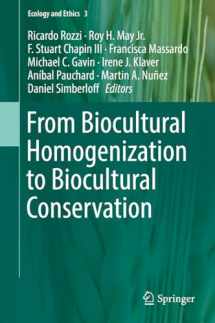
From Biocultural Homogenization to Biocultural Conservation (Ecology and Ethics, 3)
Book details
Summary
Description
To assess the social processes of globalization that are changing the way in which we co-inhabit the world today, this book invites the reader to essay the diversity of worldviews, with the diversity of ways to sustainably co-inhabit the planet. With a biocultural perspective that highlights planetary ecological and cultural heterogeneity, this book examines three interrelated themes: (1) biocultural homogenization, a global, but little perceived, driver of biological and cultural diversity loss that frequently entail social and environmental injustices; (2) biocultural ethics that considers –ontologically and axiologically– the complex interrelationships between habits, habitats, and co-inhabitants that shape their identity and well-being; (3) biocultural conservation that seeks social and ecological well-being through the conservation of biological and cultural diversity and their interrelationships.


We would LOVE it if you could help us and other readers by reviewing the book
Book review



